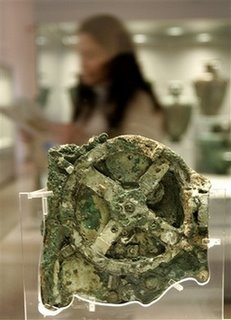- the number of days between my husband's and one of his dearest friend's birthdays
- and now the number of days between both these men's wedding anniversaries (as of the wedding that happened in early November)
- and measured in thousands of years, 21 also makes a calculated (boooo) appearance here, and brings Greeks before my eyes yet again.
So, John and Victoria...though it be a vague blessing to make, it feels nonetheless right: in all that you are positioned to represent, may you also be graced with the re-discovery of the wisdom of her heritage long forgotten, hidden and preserved in the waters that belong to him...(smile) A blessing that refers to the following news flash:

"A fragment of the 2,100-year-old Antikythera Mechanism, believed to be the earliest surviving mechanical computing device, is seen at the National Archaeological Museum in Athens, Thursday, Nov. 30, 2006. The bronze system of cogs and wheels was found in a Roman wreck off southern Greece in 1900...
...The computer is so advanced in its mathematics and technology that the history of ancient Greece may have to be rewritten, contends Edmunds.
"We now must ask: What else could they do? That's a difficult thing, because this is really the only surviving metallic artefact of its kind. Who knows what else may be lost?"
It was not until the end of the first millennium AD and the golden age of Islamic science that anything so technologically wondrous surfaced again, if the archaeological evidence is a guide.
This was an eight-geared astrolabe, depicting the movements of the Sun and Earth, by the Islamic astronomer al-Biruni in AD 996.
Had the Greeks' knowledge somehow survived and been transmitted across the centuries, to inspire al-Biruni? Or had it withered away and disappeared, leaving Islamic scholars with the task of rediscovering what had been known a thousand years before?"

1 comment:
hahahaha...have a great trip, you two.
Post a Comment